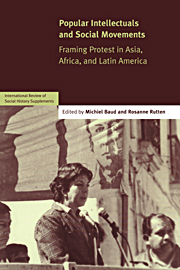Book contents
- Frontmatter
- Contents
- List of Contributors
- Introduction
- Framing, Transnational Diffusion, and African-American Intellectuals in the Land of Gandhi
- Indigenous Communists and Urban Intellectuals in Cayambe, Ecuador (1926–1944)
- Reforming Mysticism: Sindhi Separatist Intellectuals in Pakistan
- Unemployed Intellectuals in the Sahara: The Teshumara Nationalist Movement and the Revolutions in Tuareg Society
- Between Sovereignty and Culture: Who is an Indigenous Intellectual in Colombia?
- Critics and Experts, Activists and Academics: Intellectuals in the Fight for Social and Ecological Justice in the Narmada Valley, India
- Framing Jihad: Intramovement Framing Contests and al-Qaeda's Struggle for Sacred Authority
- Popular Publics: Street Protest and Plaza Preachers in Caracas
- Concluding Remarks: Framing Protest in Asia, Africa, and Latin America
Between Sovereignty and Culture: Who is an Indigenous Intellectual in Colombia?
Published online by Cambridge University Press: 04 August 2010
- Frontmatter
- Contents
- List of Contributors
- Introduction
- Framing, Transnational Diffusion, and African-American Intellectuals in the Land of Gandhi
- Indigenous Communists and Urban Intellectuals in Cayambe, Ecuador (1926–1944)
- Reforming Mysticism: Sindhi Separatist Intellectuals in Pakistan
- Unemployed Intellectuals in the Sahara: The Teshumara Nationalist Movement and the Revolutions in Tuareg Society
- Between Sovereignty and Culture: Who is an Indigenous Intellectual in Colombia?
- Critics and Experts, Activists and Academics: Intellectuals in the Fight for Social and Ecological Justice in the Narmada Valley, India
- Framing Jihad: Intramovement Framing Contests and al-Qaeda's Struggle for Sacred Authority
- Popular Publics: Street Protest and Plaza Preachers in Caracas
- Concluding Remarks: Framing Protest in Asia, Africa, and Latin America
Summary
Summary: Recent studies of Latin American indigenous intellectuals affiliated with social movements demonstrate that, while the hold that national intellectuals have as mediators between the state and civil society may be precarious, intellectuals from subordinated minorities are intermediaries between the national society and minority groups, successfully articulating ethnic strivings within national arenas and building ethnic discourses in local communities. But in order to comprehend the success of indigenous intellectuals, it is necessary to inquire into how their discourse is developed internally. To achieve this, we must pay close attention to the heterogeneity of the indigenous movement, in which an array of different types of intellectuals interact and debate issues in a range of ethnic organizations. This article explores the complexities of the negotiation of ethnic discourse by intellectuals within the Regional Indigenous Council of Cauca, a Colombian indigenous organization, focusing on a conflict in which indigenous cultural activists and politicians are at loggerheads over the nature of indigenous political autonomy.
INTELLECTUALS IN LATIN AMERICA
Some observers assert that post-Cold-War Latin American intellectuals are in crisis, having lost their status as mediators between strong Latin American states and weak civil societies. In their traditional role as importers of ideas from abroad – what Brazilian literary critic Roberto Schwarz has called “misplaced ideas” – intellectuals have simultaneously stood in for international thinkers and for local constituencies.
- Type
- Chapter
- Information
- Popular Intellectuals and Social MovementsFraming Protest in Asia, Africa, and Latin America, pp. 111 - 132Publisher: Cambridge University PressPrint publication year: 2005
- 1
- Cited by

